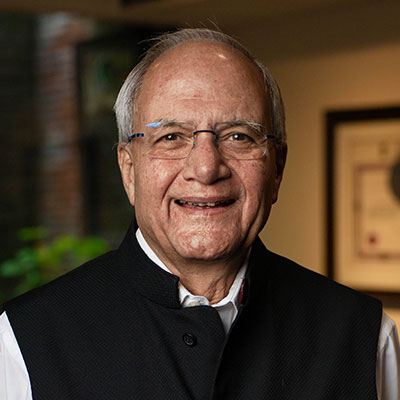
Dr. Ajai Chowdhry
Cofounder HCL, Padma Bhushan Recipient
Distinguished Fellow – NITI Aayog
Dr. Ajai Chowdhry is a visionary pioneer who cofounded HCL in 1976 with five others, with a dream of using the microprocessor and changing the world. He spearheaded HCL’s expansion into Singapore in 1980, and created a successful business spanning ASEAN, China, and Hong Kong. Today, HCL is valued at an impressive US $50 billion.
In 1995, Ajai took over HCL Infosystems and was instrumental in turning it into a leader in hardware products, systems integration, and mobile telephony through the distribution of Nokia handsets. Under his leadership over the next 15 years, it grew to become a Rs. 12,000 crore (US $1.6 billion) organization.
Ajai has played a leading role in the establishment of the electronics industry in India, serving on government committees since 1999. In 2009, he chaired a task force created by Ministry of Electronics & Information Technology (MEITY), which made ground-breaking recommendations regarding the country’s electronics import bill, warning that it would soon surpass the bill for imported oil. These recommendations formed the foundation of the Electronics Policy.
He is Chairman of the Mission Governing Board of the National Quantum Mission of India, Distinguished Fellow at NITI Aayog (public policy think tank of Government of India), and Fellow at Indian National Academy of Engineers. He has been nominated by MEITY as a Member to the Advisory Board of India Semiconductor Mission.
In recognition of his efforts to build the IT & Electronics industry in India, in 2011 he was conferred the prestigious Padma Bhushan, the third highest civilian honour in India, by the Hon’ble President of India. He is the recipient of many other awards including Lifetime Achievement Award by Electronics Sector Skills Council of India (ESSCI) in 2024, Electronics Man of the Year 2010, CNBC TV18’s India Innovator of the Year Award 2010, and Cybermedia Business ICT Award 2013 for Lifetime Achievement in ICT.
As an institution builder, Ajai has played a crucial role in shaping centres of learning and creating spaces for intellectual growth and development. These include IIT Hyderabad and IIIT-Naya Raipur which he as Chairperson helped set up and develop into the reputable institutions that they are today. As Chairperson of NIFFT Ranchi, he was responsible for transforming it into National Institute of Advanced Manufacturing, to serve the needs of ‘Industry 4.0’. Ajai has also served as Chairperson of the Electronics Sector Skills Council of India (ESSCI).
Ajai’s philanthropic efforts include setting up a charitable trust called Swayam, which focuses on education and women’s empowerment, among other causes. Swayam has recently set-up the Aspire Scholarship for B.Tech students from eleven renowned engineering institutes across India. This prestigious initiative aims to provide essential support to aspiring engineers who face financial obstacles in their pursuit of higher education
He is also a Board Member of the Population Foundation of India and a Trustee of the Save Life Foundation.
Since 2011, Ajai has been deeply involved in nurturing, mentoring, and investing in startups and has personally invested in more than 50 of them. He is also on the Investment Committee of Electronic Development Fund and Canbank Venture Capital Fund.
Regarded as the ‘father of Indian hardware’, Ajai has been a relentless advocate of self-sufficiency in electronics. In keeping with this vision, he co-founded EPIC Foundation in 2021, a not-for-profit, with the aim to make India a Product Nation in electronics (and unleashing an economic potential of US $20 billion).
Ajai holds a Bachelor’s degree in Electronics and Telecommunication Engineering from Jabalpur Engineering College. He has attended the Executive Program at the School of Business Administration at University of Michigan, US. He has also been awarded Honoris Causa (D.Sc) by IIT Roorkee, Indian Institute of Information Technology, Design & Manufacturing, Jabalpur, and University of Engineering & Management Kolkata.
His memoir, Just Aspire: Notes on Technology, Entrepreneurship and the Future, is published by HarperCollins India.
LinkedIn Instagram Twitter Facebook
www.ajaichowdhry.in
